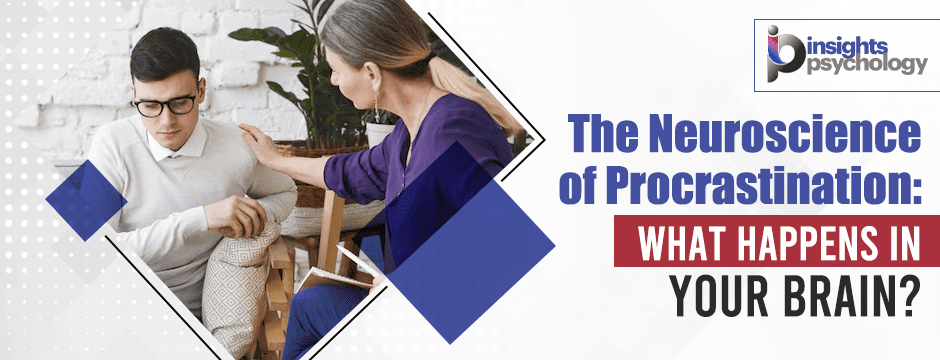Procrastination is a universal human experience. From postponing a minor household task to delaying a critical project, nearly everyone has grappled with the puzzling act of putting things off. While we often blame procrastination on laziness or poor time management, the truth is far more complex. Procrastination is deeply rooted in the intricate workings of the brain, where emotional regulation, decision-making, and self-control intertwine in fascinating ways.
In this article, we explore the neuroscience of procrastination, unraveling the brain’s role in this behavior, explaining why it happens, and offering strategies for countering it. By understanding the science behind procrastination, you can make informed decisions to reclaim your time and productivity.
What Is Procrastination?
Procrastination is often misunderstood as mere laziness or poor time management, but it’s far more nuanced than that. At its core, procrastination is the voluntary delay of a planned action, even when you know that postponing it may lead to negative consequences, such as missed deadlines, increased stress, or diminished performance.
This behavior isn’t necessarily about avoiding work altogether but prioritizing short-term comfort over long-term goals. For example, instead of tackling a challenging project, you might find yourself scrolling social media, binge-watching videos, or engaging in less demanding tasks.
What intrigues procrastination is that it’s not just a productivity issue; it’s deeply rooted in emotions, habits, and cognitive processes. It involves a complex interplay between your brain’s emotional and rational centers. Often, people procrastinate to escape feelings of fear, anxiety, or self-doubt associated with a task, even though this avoidance ultimately makes the situation worse.
In essence, procrastination is a coping mechanism—a way to sidestep discomfort temporarily—but it comes at the cost of long-term well-being and success. Recognizing its underlying psychological and neurological roots is the first step toward overcoming it.
The Neuroscience of Procrastination
Procrastination isn’t just a bad habit—it’s a clash between two parts of the brain: the limbic system and the prefrontal cortex. Here’s a breakdown of how each plays a role:
1. The Limbic System: The Emotional Driver
The limbic system is the brain’s emotional hub, processing pleasure, pain, and reward. When faced with an unpleasant or challenging task, the limbic system seeks to avoid discomfort.
- The Role of the Amygdala: The amygdala, a key structure within the limbic system, processes emotions like fear and anxiety. When a task triggers overwhelming feelings, the amygdala activates, steering you toward immediate relief—such as scrolling social media or binge-watching a series.
- Dopamine and Instant Gratification: The brain’s reward system often fuels procrastination. Engaging in a more enjoyable, immediate activity releases dopamine, the “feel-good” chemical, reinforcing the habit of avoiding the challenging task.
2. The Prefrontal Cortex: The Rational Planner
The prefrontal cortex, located at the front of the brain, is responsible for executive functions like decision-making, planning, and impulse control. It helps you prioritize long-term goals over short-term gratification.
When you procrastinate, the prefrontal cortex struggles to override the limbic system’s emotional impulses. This tug-of-war between emotional avoidance and rational decision-making is at the heart of procrastination.
The Science of Temporal Discounting
A fascinating concept tied to procrastination is temporal discounting, which explains why people tend to devalue rewards or consequences that are far in the future. For instance, the reward of completing a project weeks from now feels less motivating than the immediate gratification of watching a funny video.
Research using fMRI scans has shown that the prefrontal cortex is activated when people make decisions involving delayed rewards. However, when immediate rewards are involved, the limbic system dominates. This imbalance in activation often leads to procrastination.
Procrastination and the Stress Response
Interestingly, procrastination is closely linked to stress. Avoiding a task temporarily reduces stress by providing immediate relief, but the looming deadline often increases anxiety later. This creates a vicious cycle:
- Task Avoidance → Temporary Stress Relief
- Approaching Deadline → Heightened Stress
- Pressure to Perform → Rush to Complete Task
Chronic procrastination can rewire your brain, strengthening avoidance pathways while weakening your ability to confront challenges head-on.
The Role of Personality and Brain Chemistry
1. Perfectionism and Procrastination
While it may seem counterintuitive, perfectionists are particularly prone to procrastination. Why? The fear of making mistakes or producing imperfect work activates the brain’s threat response, triggering avoidance behaviors.
2. ADHD and Executive Dysfunction
Individuals with ADHD (Attention Deficit Hyperactivity Disorder) often struggle with procrastination due to impaired executive functioning. Research reveals that the prefrontal cortex in ADHD brains shows reduced activity, making it harder to plan and resist distractions.
3. Neurotransmitter Imbalances
Low levels of dopamine or serotonin can exacerbate procrastination. These neurotransmitters are essential for motivation and mood regulation, and their imbalance can make tasks feel overwhelming or unimportant.
How Chronic Procrastination Affects the Brain
Procrastination impacts productivity and can alter the structure and function of the brain over time.
1. Neural Pathways and Habits
Repeated procrastination strengthens neural pathways associated with avoidance, making it easier to delay tasks in the future. Conversely, pathways for discipline and focus weaken.
2. Gray Matter Reduction in the Prefrontal Cortex
Studies show that chronic procrastination may be linked to reduced gray matter in the prefrontal cortex, affecting decision-making and impulse control.
3. Increased Stress Hormones
Frequent procrastination raises cortisol levels, the body’s stress hormone, which can impair memory, focus, and overall mental health.
Breaking the Cycle: Neuroscience-Backed Strategies to Overcome Procrastination
Understanding the neuroscience of procrastination empowers you to tackle it effectively. Here are proven strategies to rewire your brain and regain control:
1. Practice Time-Chunking
Time-chunking involves breaking tasks into small, manageable segments. This reduces the brain’s perception of a task as overwhelming, helping the prefrontal cortex take charge.
Example: Instead of saying, “I need to write a 10-page report,” aim to write just one page in 20 minutes.
2. Use the Pomodoro Technique
The Pomodoro Technique is a time-management method where you work in focused 25-minute intervals followed by a short break. This trains your brain to stay engaged while still offering periodic rewards.
3. Reframe the Task
Cognitive reframing involves changing how you view the task. Instead of thinking, “This is too hard,” try, “This is an opportunity to learn.” Positive associations reduce the limbic system’s resistance.
4. Reward Yourself
After completing a task, reward yourself with something enjoyable. This reinforces productive behaviors and satisfies your brain’s craving for dopamine.
5. Address Underlying Emotions
Since procrastination is often rooted in emotional avoidance, identifying and addressing these emotions can help. Journaling, therapy, or mindfulness exercises can be effective tools.
6. Cultivate Self-Compassion
Be kind to yourself when you procrastinate. Self-criticism can exacerbate stress, while self-compassion promotes emotional resilience and encourages progress.
7. Leverage Technology
Apps like Forest, Focus@Will, or Todoist can keep you accountable and help structure your day.
Neuroscience Insights: Why Procrastination Feels Good (at First)
Procrastination initially feels good because it activates the brain’s reward system through dopamine release. Dopamine is a neurotransmitter associated with pleasure and satisfaction, often triggered by behaviors that provide immediate gratification. When you avoid a challenging or unpleasant task in favor of something more enjoyable—like watching TV, scrolling social media, or even organizing your desk—the brain experiences a short-term “reward” by reducing stress or discomfort in the moment.
This temporary relief stems from the limbic system, the brain’s emotional center, which prioritizes avoiding pain and seeking pleasure. However, this “quick fix” is fleeting and priced. The task you avoided doesn’t disappear; instead, it looms larger as deadlines approach, leading to heightened stress and feelings of guilt or failure. This emotional aftermath can perpetuate the cycle of procrastination, as you might once again seek short-term comfort to escape those negative feelings.
By recognizing this cycle, you can shift your focus to delayed gratification—choosing actions that bring long-term rewards over instant pleasure. Developing this skill strengthens the prefrontal cortex, helping you override impulsive decisions and paving the way for greater success, satisfaction, and emotional resilience.
Final Thoughts: Reclaiming Control Over Procrastination
Procrastination is more than a quirk of human behavior; it’s a fascinating interplay of the brain’s emotional and cognitive systems. By recognizing how the limbic system and prefrontal cortex shape your actions, you can implement strategies to overcome this challenge.
At Insights Psychology, we aim to help you unlock the science behind your behaviors and use that knowledge for personal growth. Procrastination may feel like a hurdle, but with the right tools, you can turn it into an opportunity for self-discovery and resilience.
Remember: every step toward action rewires your brain for success. So start small, stay consistent, and celebrate your progress!
For more articles on psychology and self-improvement, explore the Insights Psychology blog.
FAQs About the Neuroscience of Procrastination
1. Is procrastination a mental health issue?
Procrastination itself is not a mental health disorder, but it can be a symptom of conditions like anxiety, depression, or ADHD.
2. Can you completely overcome procrastination?
While occasional procrastination is natural, consistent effort and habit-building can significantly reduce it.
3. Are some people more prone to procrastination?
Yes, personality traits, brain chemistry, and genetic factors can influence your procrastination predisposition.
Think procrastination is tough? What about addiction?
Push your understanding further with The Science of Addiction: What is Addiction, and How Can We Overcome It? and challenge yourself to grow.

